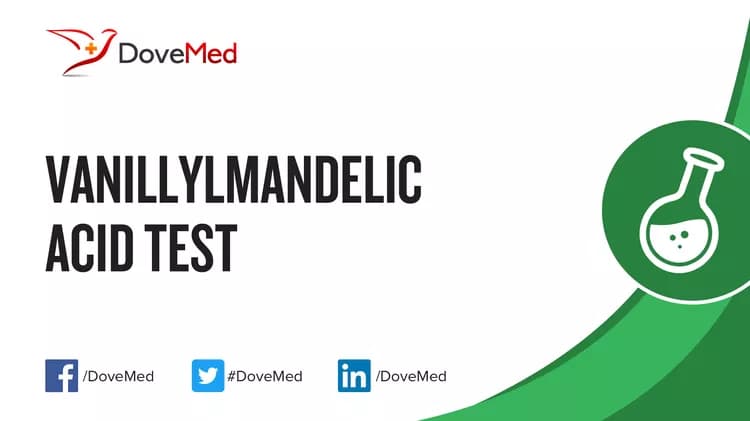What are the other Names for this Test? (Equivalent Terms)
- VMA Test
What is Vanillylmandelic Acid Test? (Background Information)
- Vanillylmandelic acid (VMA) is a final breakdown product of the ‘fight-or-flight’ hormones epinephrine and norepinephrine (also called adrenaline and noradrenaline). VMA levels are used as an indicator of epinephrine and norepinephrine levels
- Epinephrine and norepinephrine belong to a group of hormones, called catecholamines. Catecholamines are made in the adrenal glands. As the name implies, the 2 adrenal glands are situated atop (“ad-“ or “supra-“) each kidney (“renal”)
- Epinephrine and norepinephrine are normally released into the bloodstream, to prepare the body for physical stress. They affect nearly every tissue
- These two hormones stimulate the heart to beat faster, the lung bronchioles to expand, and the liver and fat cells to mobilize their energy stores. This increases the energy available to the body. It also facilitates its transportation to tissues that require it, such as the muscles and the brain
- Certain stimulants, such as amphetamines, exert their ‘pick-me-up’ effects by imitating epinephrine and norepinephrine
- Epinephrine is broken down step-wise; first into metanephrine and then into vanillylmandelic acid. Similarly, norepinephrine is broken down into normetanephrine, and then into VMA. VMA is excreted through the urine
- Metanephrines may also appear in the urine during excessive catecholamine production, particularly in disease states, such as pheochromocytoma
- Vanillylmandelic acid is thus a useful indicator for the catecholamines, epinephrine and norepinephrine. Elevated VMA levels may indicate that elevated epinephrine and norepinephrine levels exist in the body
- The natural ‘fight-or-flight’ response evokes only small releases of epinephrine and norepinephrine by the adrenal glands. In contrast, certain neuroendocrine diseases elicit large and prolonged elevations of epinephrine and norepinephrine
- The Vanillylmandelic Acid Test is a urine test that measures the levels of vanillylmandelic acid in urine. It is useful in detecting cancers of the adrenal gland and nervous system, along with other neuroendocrine disorders
What are the Clinical Indications for performing the Vanillylmandelic Acid Test?
Following are the clinical indications for performing a Vanillylmandelic Acid Test:
- Testing for a neuroblastoma in an infant that is marked by:
- Swelling of the neck
- Lump in abdomen
- Motor difficulties
- Monitoring progression of a known neuroblastoma condition
- Excessive sweating
- High blood pressure
- Heart irregularities
- Persistent anxiety
- Weight loss
- Pale appearance
How is the Specimen Collected for Vanillylmandelic Acid Test?
Following is the specimen collection process for Vanillylmandelic Acid Test:
Sample required: Urine
Process: Urine is collected in a sterile container, often multiple times within a 24-hour period.
Preparation required: No special preparation is needed prior to the test.
What is the Significance of the Vanillylmandelic Acid Test Result?
Increased Vanillylmandelic Acid levels may indicate:
- Ganglioneuroma
- Hypertension
- Neuroblastoma
- Pheochromocytoma
The laboratory test results are NOT to be interpreted as results of a "stand-alone" test. The test results have to be interpreted after correlating with suitable clinical findings and additional supplemental tests/information. Your healthcare providers will explain the meaning of your tests results, based on the overall clinical scenario.
Additional and Relevant Useful Information:
- Vanillylmandelic Acid Testing is often performed alongside a plasma-free metanephrines test and creatinine test. This allows a better assessment of epinephrine and norepinephrine metabolite levels. It also ensures that the sample collection was carried out properly
- Though rare, neuroblastomas are the most common form of cancer affecting infants
- Certain factors interfere with the results of this test and these include stress and caffeine consumption
Certain medications that you may be currently taking may influence the outcome of the test. Hence, it is important to inform your healthcare provider, the complete list of medications (including any herbal supplements) you are currently taking. This will help the healthcare provider interpret your test results more accurately and avoid unnecessary chances of a misdiagnosis.
Related Articles
Test Your Knowledge
Asked by users
Related Centers
Related Specialties
Related Physicians
Related Procedures
Related Resources
Join DoveHubs
and connect with fellow professionals


0 Comments
Please log in to post a comment.